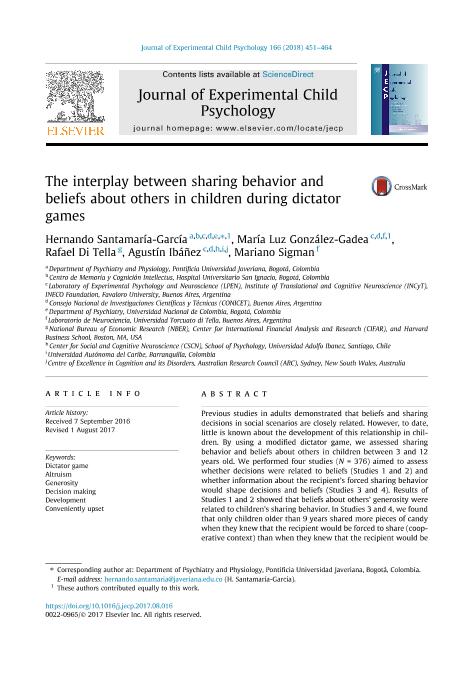Artículo
The interplay between sharing behavior and beliefs about others in children during dictator games
Santamaria Garcia, Hernando ; González Gadea, María Luz
; González Gadea, María Luz ; Di Tella, Rafael; Ibañez, Agustin Mariano
; Di Tella, Rafael; Ibañez, Agustin Mariano ; Sigman, Mariano
; Sigman, Mariano
 ; González Gadea, María Luz
; González Gadea, María Luz ; Di Tella, Rafael; Ibañez, Agustin Mariano
; Di Tella, Rafael; Ibañez, Agustin Mariano ; Sigman, Mariano
; Sigman, Mariano
Fecha de publicación:
02/2018
Editorial:
Academic Press Inc Elsevier Science
Revista:
Journal of Experimental Child Psychology
ISSN:
0022-0965
Idioma:
Inglés
Tipo de recurso:
Artículo publicado
Clasificación temática:
Resumen
Previous studies in adults demonstrated that beliefs and sharing decisions in social scenarios are closely related. However, to date, little is known about the development of this relationship in children. By using a modified dictator game, we assessed sharing behavior and beliefs about others in children between 3 and 12 years old. We performed four studies (N = 376) aimed to assess whether decisions were related to beliefs (Studies 1 and 2) and whether information about the recipient’s forced sharing behavior would shape decisions and beliefs (Studies 3 and 4). Results of Studies 1 and 2 showed that beliefs about others’ generosity were related to children’s sharing behavior. In Studies 3 and 4, we found that only children older than 9 years shared more pieces of candy when they knew that the recipient would be forced to share (cooperative context) than when they knew that the recipient would be forced not to share (noncooperative context). Besides, children older than 6 years did not modify their beliefs about others’ generosity according to these social contexts. These results suggest that normative or preconceived beliefs about the functioning of the social world may guide social behavior in children.
Archivos asociados
Licencia
Identificadores
Colecciones
Articulos(INCYT)
Articulos de INSTITUTO DE NEUROCIENCIAS COGNITIVAS Y TRASLACIONAL
Articulos de INSTITUTO DE NEUROCIENCIAS COGNITIVAS Y TRASLACIONAL
Articulos(SEDE CENTRAL)
Articulos de SEDE CENTRAL
Articulos de SEDE CENTRAL
Citación
Santamaria Garcia, Hernando; González Gadea, María Luz; Di Tella, Rafael; Ibáñez Barassi, Agustín Mariano; Sigman, Mariano; The interplay between sharing behavior and beliefs about others in children during dictator games; Academic Press Inc Elsevier Science; Journal of Experimental Child Psychology; 166; 2-2018; 451-464
Compartir
Altmétricas



